人教版八年级上册Unit 1 Where did you go on vacation?Section A (Grammar Focus-3c)语法课课件(共53张PPT)
文档属性
| 名称 | 人教版八年级上册Unit 1 Where did you go on vacation?Section A (Grammar Focus-3c)语法课课件(共53张PPT) | 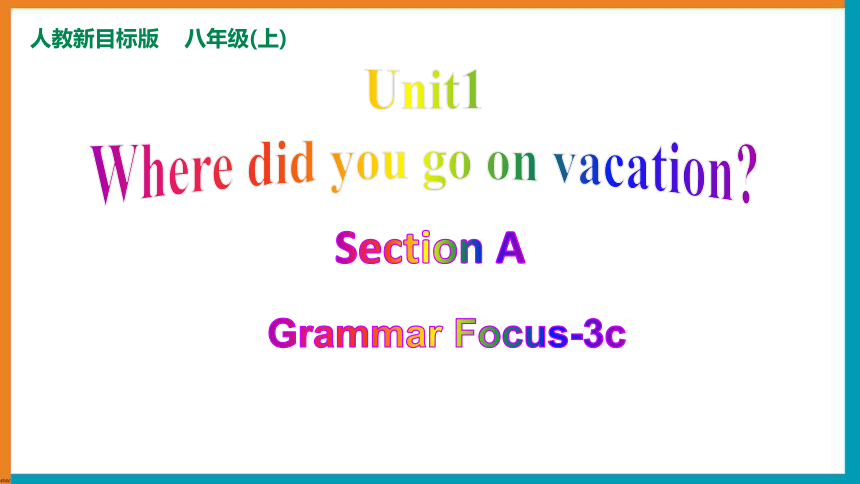 | |
| 格式 | pptx | ||
| 文件大小 | 6.8MB | ||
| 资源类型 | 教案 | ||
| 版本资源 | 人教新目标(Go for it)版 | ||
| 科目 | 英语 | ||
| 更新时间 | 2024-09-02 18:28:28 | ||
图片预览

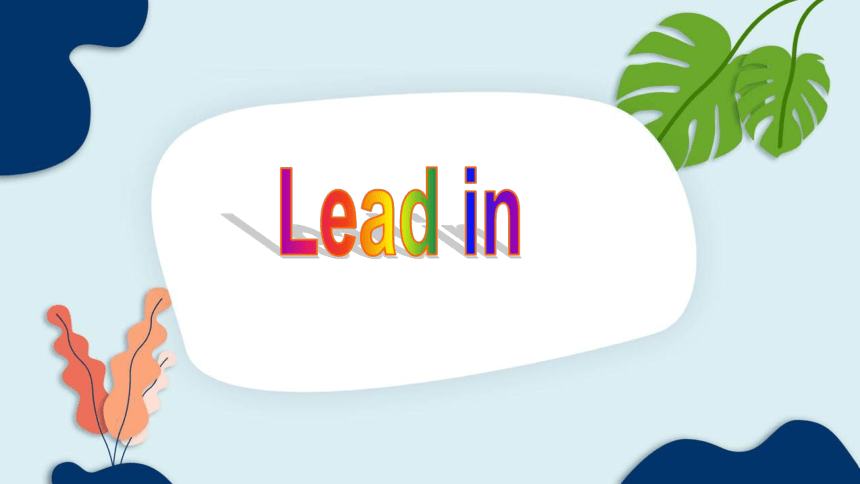

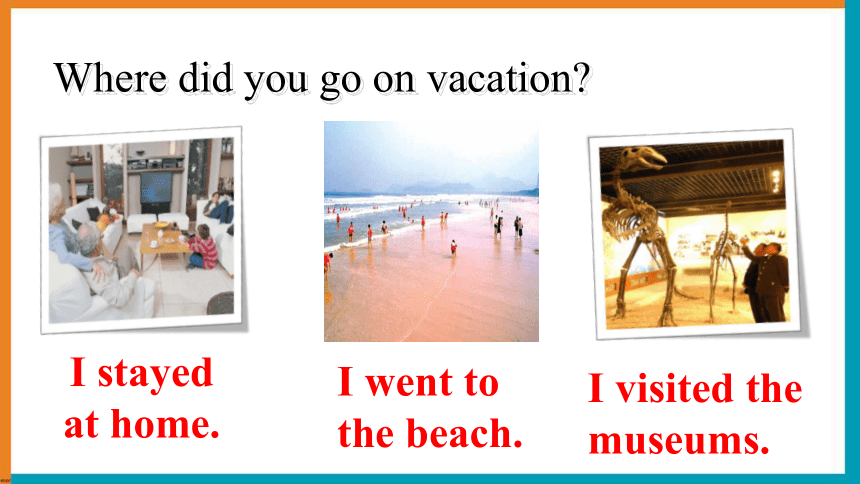
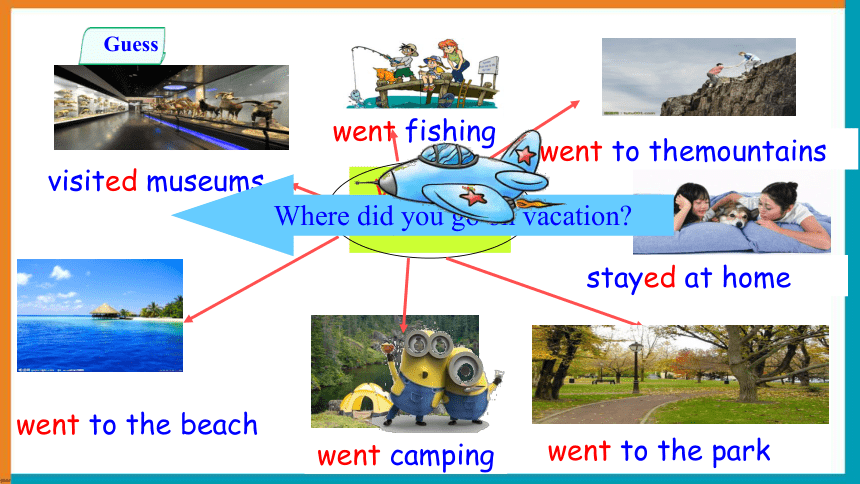
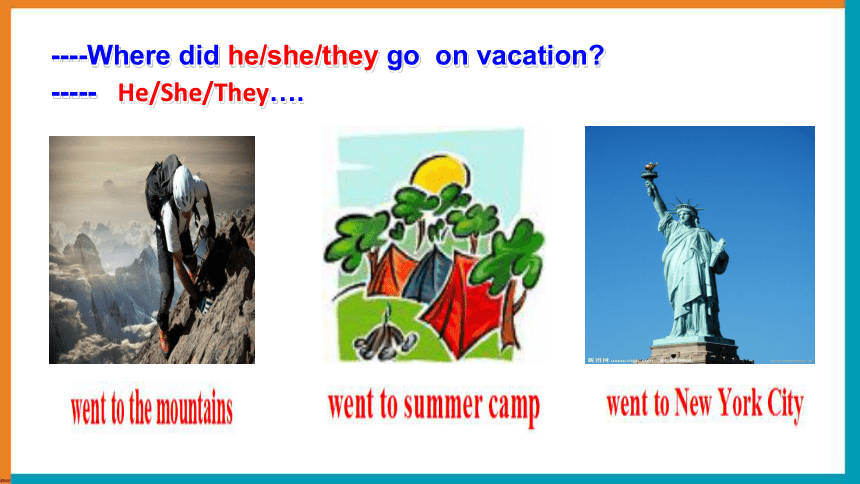
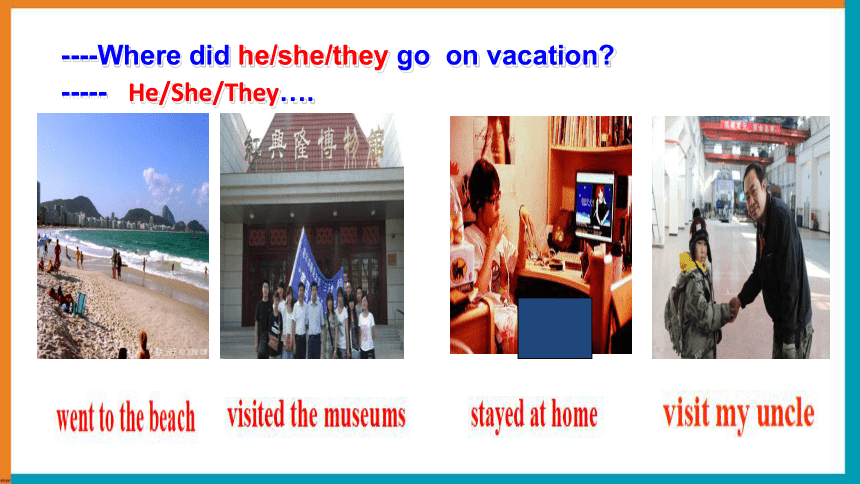
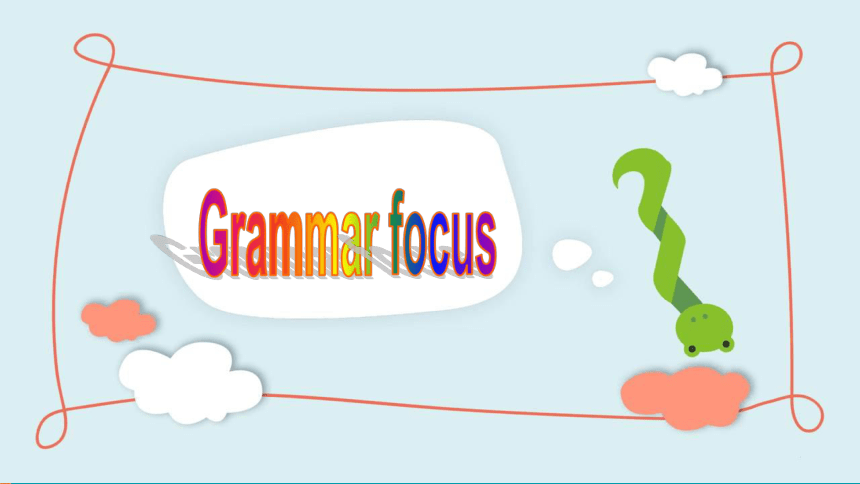
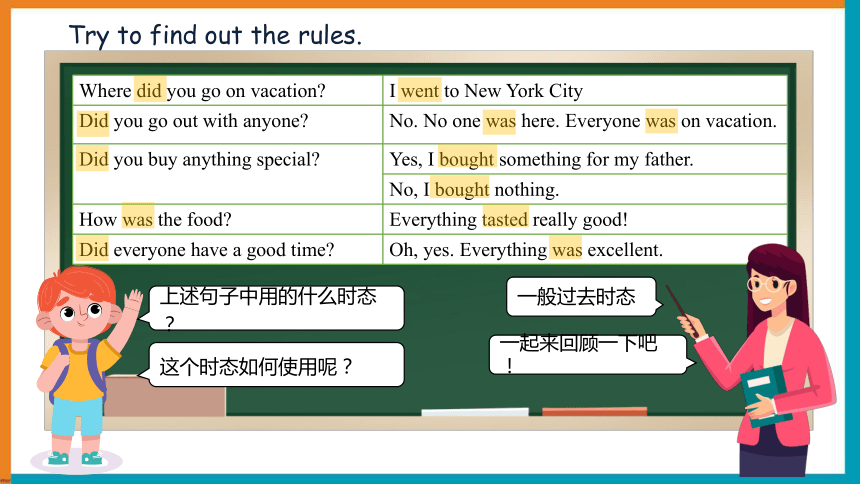
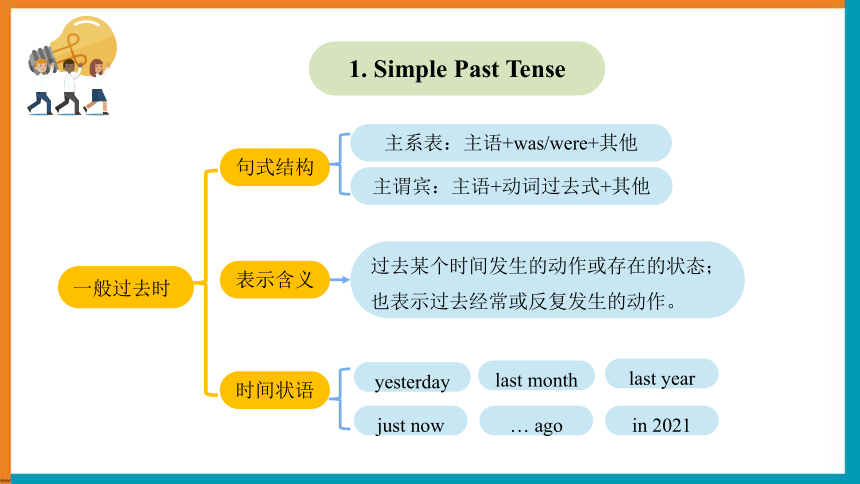
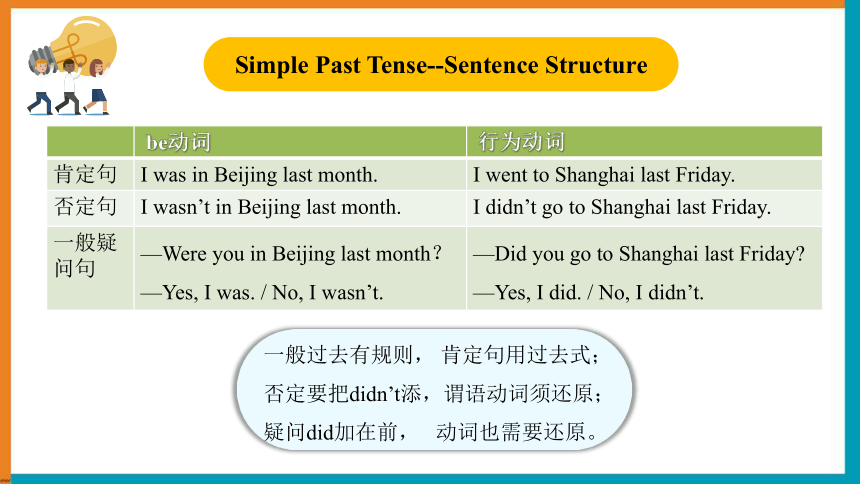
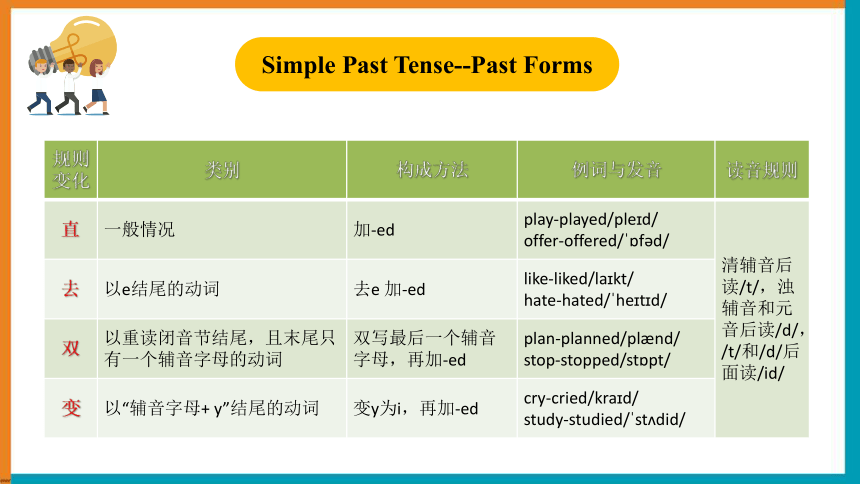
文档简介
(共53张PPT)
Section A
Unit1
Where did you go on vacation
Grammar Focus-3c
人教新目标版 八年级(上)
Review
Lead in
Where did you go on vacation
I went to the
Great Wall.
I went to the mountains.
I went to the
summer camp.
Review
I stayed
at home.
I visited the
museums.
I went to
the beach.
Where did you go on vacation
went fishing
went camping
went to the park
visited museums
went to the beach
went to themountains
Vacation
Activities
stayed at home
Where did you go on vacation
Guess
----Where did he/she/they go on vacation
----- He/She/They….
----Where did he/she/they go on vacation
----- He/She/They….
Grammar focus
Where did you go on vacation I went to New York City
Did you go out with anyone No. No one was here. Everyone was on vacation.
Did you buy anything special Yes, I bought something for my father.
No, I bought nothing.
How was the food Everything tasted really good!
Did everyone have a good time Oh, yes. Everything was excellent.
Try to find out the rules.
上述句子中用的什么时态?
一般过去时态
这个时态如何使用呢?
一起来回顾一下吧!
1. Simple Past Tense
句式结构
表示含义
时间状语
主系表:主语+was/were+其他
主谓宾:主语+动词过去式+其他
过去某个时间发生的动作或存在的状态;
也表示过去经常或反复发生的动作。
yesterday
last month
last year
just now
… ago
in 2021
一般过去时
Simple Past Tense--Sentence Structure
一般过去有规则, 肯定句用过去式;
否定要把didn’t添,谓语动词须还原;
疑问did加在前, 动词也需要还原。
be动词 行为动词
肯定句 I was in Beijing last month. I went to Shanghai last Friday.
否定句 I wasn’t in Beijing last month. I didn’t go to Shanghai last Friday.
一般疑问句 —Were you in Beijing last month? —Yes, I was. / No, I wasn’t. —Did you go to Shanghai last Friday
—Yes, I did. / No, I didn’t.
规则变化 类别 构成方法 例词与发音 读音规则
直 一般情况 加-ed play-played/ple d/ offer-offered/ f d/ 清辅音后读/t/,浊辅音和元音后读/d/,/t/和/d/后面读/id/
去 以e结尾的动词 去e 加-ed like-liked/la kt/ hate-hated/ he t d/ 双 以重读闭音节结尾,且末尾只有一个辅音字母的动词 双写最后一个辅音字母,再加-ed plan-planned/pl nd/ stop-stopped/st pt/ 变 以“辅音字母+ y”结尾的动词 变y为i,再加-ed cry-cried/kra d/ study-studied/ st did/
Simple Past Tense--Past Forms
Simple Past Tense--Past Forms
类别 例词
不规则 原形 cut cut put put hurt hurt read read shut shut
不规则 do did speak spoke come came run ran drive drove see saw
go went get got take took eat ate find found fly flew
have had give gave lose lost make made meet met swim swam
Where did you go on vacation I went to New York City
Did you go out with anyone No. No one was here. Everyone was on vacation.
Did you buy anything special Yes, I bought something for my father.
No, I bought nothing.
How was the food Everything tasted really good!
Did everyone have a good time Oh, yes. Everything was excellent.
Try to find out the rules.
上述句子中标红的词是什么词,它们要如何使用呢?
一起来探索一下复合不定代词的用法吧!
(1)定义:不指明代替任何特定名词或形容词的代词叫做不定代词。
由some,any,no,every 加上-body,-one,-thing构成的复合不定代词。
For people
someone 某人
anyone 任何人
everyone 每个人
no one 没有人
For things
everything 一切事物
something 某事物
anything 任何事物
nothing 没有东西
(2)功能
复合不定代词功能相当于名词,在句中可作主语、宾语或表语,但不能作定语。
Indefinite pronouns
(2)功能:复合不定代词功能相当于名词,在句中可作主语、宾语或表语,但不能作定语。
Indefinite pronouns
Is anybody absent 有人缺席吗?(作主语)
Did you buy anything there 你在那买了什么东西吗?(作宾语)
He is something of a scholar. 他有点像学者。( 作表语 )
复合不定代词不能作定语哦
some any
thing something anything
one someone anyone
由some和any构成的复合不定代词,如something,
anything等的用法和some和any的用法一样
考点①
肯定句
否定句
疑问句
1. 我想喝点东西。
I want _________to drink.
2.他什么也没说。
He didn't say __________.
3.你需要我从商店带点什么东西吗?
Do you need _________ from the shop
4.那个派对上的人我一个都不认识。
I don't know ___________at the party.
something
anything
anything
anyone
一般
情况
1.当some-复合不定代词可以用于疑问句,表示请求,建议,反问等,问话者希望得到肯定答复;
2.any用于肯定句,表任何,一切。
考点②
二般情况
1. 你想来点喝的吗?
Would you like _________ to drink
2. 来点喝的怎么样?
How about _________ to drink
3. 麻烦有没有人帮忙拿一下包呢?
Could _________ help me with my bag please
4. 他的父母能为他做任何事。
His parents can do _______ for him.
5. 你可以成为任何人,只要你努力。
You could be _________ if you work hard.
something
something
someone
anything
anyone
复合不定代词作主语,谓语动词用单数
考点③
1.Something ____ wrong with my watch.(be)
2.Well, everyone _______ to win. (want)
3. Nobody __________ what the weather will be like.(know)
4.There_________ something wrong with my bike.(be)
is
is
wants
knows
I meet someone interesting.
Did you meet anyone interesting
I want something special.
Did you eat anything delicious
形容词修饰复合不定代词,要置于其后。
考点④
Review
Practice
Fill in the blanks with the words in the box and practice the conversation.
3a
anyone something anything everything nothing
Did you do ___________ fun on your vacation, Alice
Yes, I did. I went to Sanya.
How did you like it
Well, it was my first time there, so _____________ was really interesting.
Did you go with ___________
Yes, I did. I went with my sister.
Did you go shopping
Of course! I bought ____________ for my parents, but __________ for myself.
Why didn’t you buy _________ for yourself
I didn’t really see ____________ I liked.
anything
everything
something
nothing
anything
anything
anyone
Linda:
Alice:
Linda:
Alice:
Linda:
Alice:
Linda:
Alice:
Linda:
Alice:
Fill in the blanks in the email message with the words in the box.
anything everything nothing everyone no one
anything
everyone/anyone
Everything
nothing
no one
3b
Read this e-mail again and answer the questions.
Dear Bill,
How was your vacation Did you do anything interesting Did anyone in the family go with you I went to a friend’s farm in the countryside with my family. Everything was great. We fed some hens and saw some baby pigs. They were so cute! The only problem was that there was nothing much to do in the evening but read. Still no one seemed to be bored. Bye for now!
Mark
1. Where did Mark go on his vacation
2. How was his vacation
4. What was the problem
5. Did anyone seem bored
3. What animal did they feed
Let's write an e-mail.
Dear Mark,
I went to ____________________ with ____________________. ____________ was great. We ______________________________ and ____________________.
____________________________________________________________. The only problem was that ________________________________________. But we ____________________. Bye for now!
Bill
anything everything nothing everyone no one
Ask your group questions about their last vacation.
Survey
3c
Did you… Everyone Someone (write the classmates’ name ) No one
eat anything at a restaurant
read anything interesting
visit anyone in your family
buy anything
keep a diary
Do a report with simple past tense and indefinite pronouns.
1
2
3
4
5
6
vacation
In our group, everyone did something interesting. Someone went to the beach ...
Review
Language points
1. think of 认为 think about 考虑
What do you think of China
= How do you like China 你认为中国怎么样?
Language points
2.否定前缀:
happy—unhappy 不开心的 2) lucky—unlucky 不幸的
3) usual—unusual 不寻常的 4) like —dislike 不喜欢
5)appear—disappear 消失 6) agree —disagree 不同意
(即使这样)仍然没有人看起来无聊。
1)seem不及物动词或系动词,“好像;似乎;看来”。
eg:Everything seems easy.一切似乎很容易。
拓展:a. seem+adj.“看起来……”。
You seem happy today.你今天看起来很高兴。
3.Still no one seemed to be bored.
b. seem+to do sth.“似乎,好像做某事”。
I seem to have a cold.我似乎感冒了。
c. It seems/seemed+从句 “看起来好像…;似乎…”。
It seems that no one believes you.
看起来好像没有人相信你。
d. seem like…“好像,似乎……”。
It seems like a good idea.它好像是个好主意。
4. 加- ed,-ing形容词的区别
此类动词有:interest, excite, relax, surprise, etc.
1)I am ________ in the __________ book. (interest)
2)It’s _________to hear the _________ news.
We are all________.(excite)
interested
interesting
exciting
exciting
excited
辨析:
1)含有- ed形容词一般在句中修饰人,作表语
2)含有-ing形容词一般在句中修饰事或物,可作表语和定语.例如:bored与boring
a. bored意为“厌烦的;感到无聊的”,一般在句中修饰人,作表语.
b. boring意为“无聊的;令人厌烦的”,一般在句中修饰事或物,可作表语和定语.
1. I’m _____ with what he said.
我对他说的话厌烦极了。
2. I find the story very _____.
我发现这个故事太无聊了
bored
boring
【典例】
【归纳】 以 ing和 ed结尾的表示情绪和情感的形容词小结:
修饰物 修饰人
interesting 令人感兴趣的 interested 感兴趣的
relaxing 令人放松的 relaxed 感到放松的
exciting 令人兴奋的 excited 感到兴奋的
surprising 令人惊讶的 surprised 感到惊讶的
moving 令人感动的 moved 感动的
【一言辨异】 He is interested in the interesting move.
他对那个有趣的电影感兴趣
5. How did you like it 你觉得它怎么样?
How do/did you like… “你觉得……怎样?”
用来询问对方的观点或看法
= What do/ did you think of…
=How do/ did you feel about…
How do you like your new job
= _____ _____ _____ _____ _____ your new job
= _____ _____ _____ _____ ______ your new job
例:你觉得你的工作怎么样?
do you think of
How do you feel about
What
6. Did you go shopping 你们去购物了吗?
例:我通常星期天去购物。
I usually go shopping on Sundays.
go shopping: 去购物;去买东西
相当于do some shopping. (同义短语)
拓展:“go + doing”形式表示“去做某事”。
go climbing go bike riding
go skating go hiking
go sightseeing go fishing
go swimming go camping
go boating go surfing
骑自行车旅行
去滑冰
去观光
去游泳
去划船
去爬山
去远足
去钓鱼
去野营
去冲浪
动
7. I bought something for my parents, but nothing for myself.
___________________________________________
Why didn't you buy anything for yourself
___________________________________________
myself意为_____, yourself 意为_____,像这样表示“某人自己
的词”叫_________。
myself yourself himself herself itself
我自己 你自己 他自己 她自己 它自己
ourselves yourselves themselves 我们自己 你们自己 他们自己 我给父母买了一些东西,但给自己什么也没买。
你为什么不给自己买东西呢?
我自己
你自己
反身代词
反身代词有:
动
1) Did you buy anything for yourself
你为你自己买什么东西了吗 (做介词宾语)
2) The old man taught himself English.
那位老人自学英语。(做动词宾语)
3) The thing itself is not important.
事情本身并不重要。(做同位语)
4) I myself visited my aunt last weekend.
上周我自己去拜访了姑姑。(做同位语)
反身代词用法:
Review
Summary
Summary
规则变化
不规则变化
时间状语
句型变换
3.以辅音字母加y结尾的单词:变y为i,加ed
4.以重度闭音节结尾且末尾只有一个辅音字母的单词:双写末尾辅音字母加ed。
am/is-was;are-were;do-did;go-went,put-put.....
1.一般情况下:词尾加ed
2.以e结尾的单词:词尾加d
last型
ago型
yesterday型
in+(过去的)时间名词
just now.....
肯定句
主语+was/were+
其它
主语+动词过去式+其它
否定句
主语+was/were+not+其它
主语+didn't+动词原形+其它
一般
疑问句
was/were+主语+其它
Yes,主语+was/were.
No,主语+wasn't/weren't.
Did+主语+动词原形+其它
Yes,主语+did.
No,主语+didn't.
Simple Past Tense
Summary
复合不定代词
指人(以-one/-body结尾)
指物(以-thing结尾)
everybody (每个人)
someone (某人)
everyone (每个人)
anyone (任何人)
everything (一切事物)
anything (任何事物)
something (某事物)
nothing (没有什么)
somebody (某人)
anybody (任何人)
no one (没有人)
nobody (没有人)
复合代词要牢记,修饰成分后边放,
如若它来作主语,谓语单数没商量。
some-代词肯定句,any-代词否、疑忙,
若是希望得肯定,some-代词不相让。
Indefinite pronouns
Review
Exercises
1. Do you have _____ to do this evening
A. important something B. anything important
C. something important
2. _____ is watching TV . Let’s turn it off .
A . Somebody B. Anybody C. Nobody
C
B
一、单项选择
Exercises
( ) 3. -- How __ your vacation
-- It was pretty good.
A. was B. were C. did D. do
( ) 4. -- Where ___ they go yesterday
-- They went to the Summer Palace.
A. are B. do C. did D. is
A
C
B
( ) 5. -- Where did you go on vacation
-- I ___ my grandma.
A. visit B. visited C. visits D. visiting
二. 用所给动词的适当形式填空。
We ______ (live) in Japan last year.
Jack________ (stop) the car last Sunday.
Tom _______ (clean) his room and ________ (study) for the Chinese test last weekend.
4.What ______ you ______(do) last night
5.On Sunday morning I _____ (play) tennis.
lived
stopped
cleaned
studied
did
do
played
1. -Do you have __________ important to tell us
-No. We have ___________ important today. (everything)
2. -Is ____________ in the classroom (anyone)
-No. Most of us are here. But ____is in the teachers’ office.
anything
nothing
everyone
someone
三、用适当的不定代词填空。
3. Mary doesn’t want to eat ____________ because she is not hungry. (something)
4. Mike has ______________ special to show me. I’m excited about that. (nothing)
anything
something
四、句型转换。
Lucy did her homework at home. (改否定句)
2. He found some meat in the fridge(冰箱).
(变一般疑问句)
3. She stayed there for a week.(画线部分提问)
Lucy didn’t do her homework at home.
Did he find any meat in the fridge
How long did she stay there
4. She went to the beach last Sunday.
(变一般疑问句)
5.They stayed at home on vacation.(就画线部分提问)
Did she go to the beach last Sunday
Where did they stay on vacation
1. He ____here only a few minutes _____.
仅仅几分钟前他还在这里。
2. I ____ home just ____.我刚回到家。
3. I ____ ____ very early this morning.
今天早晨我起床很早。
4. He ____ ____ for school again today.今天他又迟到了。
5. I _____ my room _____ week.
上周我打扫了我的房间。
五、根据汉语完成句子,每空一词。
was
ago
came
now
got up
was late
cleaned
last
Thank you !
Section A
Unit1
Where did you go on vacation
Grammar Focus-3c
人教新目标版 八年级(上)
Review
Lead in
Where did you go on vacation
I went to the
Great Wall.
I went to the mountains.
I went to the
summer camp.
Review
I stayed
at home.
I visited the
museums.
I went to
the beach.
Where did you go on vacation
went fishing
went camping
went to the park
visited museums
went to the beach
went to themountains
Vacation
Activities
stayed at home
Where did you go on vacation
Guess
----Where did he/she/they go on vacation
----- He/She/They….
----Where did he/she/they go on vacation
----- He/She/They….
Grammar focus
Where did you go on vacation I went to New York City
Did you go out with anyone No. No one was here. Everyone was on vacation.
Did you buy anything special Yes, I bought something for my father.
No, I bought nothing.
How was the food Everything tasted really good!
Did everyone have a good time Oh, yes. Everything was excellent.
Try to find out the rules.
上述句子中用的什么时态?
一般过去时态
这个时态如何使用呢?
一起来回顾一下吧!
1. Simple Past Tense
句式结构
表示含义
时间状语
主系表:主语+was/were+其他
主谓宾:主语+动词过去式+其他
过去某个时间发生的动作或存在的状态;
也表示过去经常或反复发生的动作。
yesterday
last month
last year
just now
… ago
in 2021
一般过去时
Simple Past Tense--Sentence Structure
一般过去有规则, 肯定句用过去式;
否定要把didn’t添,谓语动词须还原;
疑问did加在前, 动词也需要还原。
be动词 行为动词
肯定句 I was in Beijing last month. I went to Shanghai last Friday.
否定句 I wasn’t in Beijing last month. I didn’t go to Shanghai last Friday.
一般疑问句 —Were you in Beijing last month? —Yes, I was. / No, I wasn’t. —Did you go to Shanghai last Friday
—Yes, I did. / No, I didn’t.
规则变化 类别 构成方法 例词与发音 读音规则
直 一般情况 加-ed play-played/ple d/ offer-offered/ f d/ 清辅音后读/t/,浊辅音和元音后读/d/,/t/和/d/后面读/id/
去 以e结尾的动词 去e 加-ed like-liked/la kt/ hate-hated/ he t d/ 双 以重读闭音节结尾,且末尾只有一个辅音字母的动词 双写最后一个辅音字母,再加-ed plan-planned/pl nd/ stop-stopped/st pt/ 变 以“辅音字母+ y”结尾的动词 变y为i,再加-ed cry-cried/kra d/ study-studied/ st did/
Simple Past Tense--Past Forms
Simple Past Tense--Past Forms
类别 例词
不规则 原形 cut cut put put hurt hurt read read shut shut
不规则 do did speak spoke come came run ran drive drove see saw
go went get got take took eat ate find found fly flew
have had give gave lose lost make made meet met swim swam
Where did you go on vacation I went to New York City
Did you go out with anyone No. No one was here. Everyone was on vacation.
Did you buy anything special Yes, I bought something for my father.
No, I bought nothing.
How was the food Everything tasted really good!
Did everyone have a good time Oh, yes. Everything was excellent.
Try to find out the rules.
上述句子中标红的词是什么词,它们要如何使用呢?
一起来探索一下复合不定代词的用法吧!
(1)定义:不指明代替任何特定名词或形容词的代词叫做不定代词。
由some,any,no,every 加上-body,-one,-thing构成的复合不定代词。
For people
someone 某人
anyone 任何人
everyone 每个人
no one 没有人
For things
everything 一切事物
something 某事物
anything 任何事物
nothing 没有东西
(2)功能
复合不定代词功能相当于名词,在句中可作主语、宾语或表语,但不能作定语。
Indefinite pronouns
(2)功能:复合不定代词功能相当于名词,在句中可作主语、宾语或表语,但不能作定语。
Indefinite pronouns
Is anybody absent 有人缺席吗?(作主语)
Did you buy anything there 你在那买了什么东西吗?(作宾语)
He is something of a scholar. 他有点像学者。( 作表语 )
复合不定代词不能作定语哦
some any
thing something anything
one someone anyone
由some和any构成的复合不定代词,如something,
anything等的用法和some和any的用法一样
考点①
肯定句
否定句
疑问句
1. 我想喝点东西。
I want _________to drink.
2.他什么也没说。
He didn't say __________.
3.你需要我从商店带点什么东西吗?
Do you need _________ from the shop
4.那个派对上的人我一个都不认识。
I don't know ___________at the party.
something
anything
anything
anyone
一般
情况
1.当some-复合不定代词可以用于疑问句,表示请求,建议,反问等,问话者希望得到肯定答复;
2.any用于肯定句,表任何,一切。
考点②
二般情况
1. 你想来点喝的吗?
Would you like _________ to drink
2. 来点喝的怎么样?
How about _________ to drink
3. 麻烦有没有人帮忙拿一下包呢?
Could _________ help me with my bag please
4. 他的父母能为他做任何事。
His parents can do _______ for him.
5. 你可以成为任何人,只要你努力。
You could be _________ if you work hard.
something
something
someone
anything
anyone
复合不定代词作主语,谓语动词用单数
考点③
1.Something ____ wrong with my watch.(be)
2.Well, everyone _______ to win. (want)
3. Nobody __________ what the weather will be like.(know)
4.There_________ something wrong with my bike.(be)
is
is
wants
knows
I meet someone interesting.
Did you meet anyone interesting
I want something special.
Did you eat anything delicious
形容词修饰复合不定代词,要置于其后。
考点④
Review
Practice
Fill in the blanks with the words in the box and practice the conversation.
3a
anyone something anything everything nothing
Did you do ___________ fun on your vacation, Alice
Yes, I did. I went to Sanya.
How did you like it
Well, it was my first time there, so _____________ was really interesting.
Did you go with ___________
Yes, I did. I went with my sister.
Did you go shopping
Of course! I bought ____________ for my parents, but __________ for myself.
Why didn’t you buy _________ for yourself
I didn’t really see ____________ I liked.
anything
everything
something
nothing
anything
anything
anyone
Linda:
Alice:
Linda:
Alice:
Linda:
Alice:
Linda:
Alice:
Linda:
Alice:
Fill in the blanks in the email message with the words in the box.
anything everything nothing everyone no one
anything
everyone/anyone
Everything
nothing
no one
3b
Read this e-mail again and answer the questions.
Dear Bill,
How was your vacation Did you do anything interesting Did anyone in the family go with you I went to a friend’s farm in the countryside with my family. Everything was great. We fed some hens and saw some baby pigs. They were so cute! The only problem was that there was nothing much to do in the evening but read. Still no one seemed to be bored. Bye for now!
Mark
1. Where did Mark go on his vacation
2. How was his vacation
4. What was the problem
5. Did anyone seem bored
3. What animal did they feed
Let's write an e-mail.
Dear Mark,
I went to ____________________ with ____________________. ____________ was great. We ______________________________ and ____________________.
____________________________________________________________. The only problem was that ________________________________________. But we ____________________. Bye for now!
Bill
anything everything nothing everyone no one
Ask your group questions about their last vacation.
Survey
3c
Did you… Everyone Someone (write the classmates’ name ) No one
eat anything at a restaurant
read anything interesting
visit anyone in your family
buy anything
keep a diary
Do a report with simple past tense and indefinite pronouns.
1
2
3
4
5
6
vacation
In our group, everyone did something interesting. Someone went to the beach ...
Review
Language points
1. think of 认为 think about 考虑
What do you think of China
= How do you like China 你认为中国怎么样?
Language points
2.否定前缀:
happy—unhappy 不开心的 2) lucky—unlucky 不幸的
3) usual—unusual 不寻常的 4) like —dislike 不喜欢
5)appear—disappear 消失 6) agree —disagree 不同意
(即使这样)仍然没有人看起来无聊。
1)seem不及物动词或系动词,“好像;似乎;看来”。
eg:Everything seems easy.一切似乎很容易。
拓展:a. seem+adj.“看起来……”。
You seem happy today.你今天看起来很高兴。
3.Still no one seemed to be bored.
b. seem+to do sth.“似乎,好像做某事”。
I seem to have a cold.我似乎感冒了。
c. It seems/seemed+从句 “看起来好像…;似乎…”。
It seems that no one believes you.
看起来好像没有人相信你。
d. seem like…“好像,似乎……”。
It seems like a good idea.它好像是个好主意。
4. 加- ed,-ing形容词的区别
此类动词有:interest, excite, relax, surprise, etc.
1)I am ________ in the __________ book. (interest)
2)It’s _________to hear the _________ news.
We are all________.(excite)
interested
interesting
exciting
exciting
excited
辨析:
1)含有- ed形容词一般在句中修饰人,作表语
2)含有-ing形容词一般在句中修饰事或物,可作表语和定语.例如:bored与boring
a. bored意为“厌烦的;感到无聊的”,一般在句中修饰人,作表语.
b. boring意为“无聊的;令人厌烦的”,一般在句中修饰事或物,可作表语和定语.
1. I’m _____ with what he said.
我对他说的话厌烦极了。
2. I find the story very _____.
我发现这个故事太无聊了
bored
boring
【典例】
【归纳】 以 ing和 ed结尾的表示情绪和情感的形容词小结:
修饰物 修饰人
interesting 令人感兴趣的 interested 感兴趣的
relaxing 令人放松的 relaxed 感到放松的
exciting 令人兴奋的 excited 感到兴奋的
surprising 令人惊讶的 surprised 感到惊讶的
moving 令人感动的 moved 感动的
【一言辨异】 He is interested in the interesting move.
他对那个有趣的电影感兴趣
5. How did you like it 你觉得它怎么样?
How do/did you like… “你觉得……怎样?”
用来询问对方的观点或看法
= What do/ did you think of…
=How do/ did you feel about…
How do you like your new job
= _____ _____ _____ _____ _____ your new job
= _____ _____ _____ _____ ______ your new job
例:你觉得你的工作怎么样?
do you think of
How do you feel about
What
6. Did you go shopping 你们去购物了吗?
例:我通常星期天去购物。
I usually go shopping on Sundays.
go shopping: 去购物;去买东西
相当于do some shopping. (同义短语)
拓展:“go + doing”形式表示“去做某事”。
go climbing go bike riding
go skating go hiking
go sightseeing go fishing
go swimming go camping
go boating go surfing
骑自行车旅行
去滑冰
去观光
去游泳
去划船
去爬山
去远足
去钓鱼
去野营
去冲浪
动
7. I bought something for my parents, but nothing for myself.
___________________________________________
Why didn't you buy anything for yourself
___________________________________________
myself意为_____, yourself 意为_____,像这样表示“某人自己
的词”叫_________。
myself yourself himself herself itself
我自己 你自己 他自己 她自己 它自己
ourselves yourselves themselves 我们自己 你们自己 他们自己 我给父母买了一些东西,但给自己什么也没买。
你为什么不给自己买东西呢?
我自己
你自己
反身代词
反身代词有:
动
1) Did you buy anything for yourself
你为你自己买什么东西了吗 (做介词宾语)
2) The old man taught himself English.
那位老人自学英语。(做动词宾语)
3) The thing itself is not important.
事情本身并不重要。(做同位语)
4) I myself visited my aunt last weekend.
上周我自己去拜访了姑姑。(做同位语)
反身代词用法:
Review
Summary
Summary
规则变化
不规则变化
时间状语
句型变换
3.以辅音字母加y结尾的单词:变y为i,加ed
4.以重度闭音节结尾且末尾只有一个辅音字母的单词:双写末尾辅音字母加ed。
am/is-was;are-were;do-did;go-went,put-put.....
1.一般情况下:词尾加ed
2.以e结尾的单词:词尾加d
last型
ago型
yesterday型
in+(过去的)时间名词
just now.....
肯定句
主语+was/were+
其它
主语+动词过去式+其它
否定句
主语+was/were+not+其它
主语+didn't+动词原形+其它
一般
疑问句
was/were+主语+其它
Yes,主语+was/were.
No,主语+wasn't/weren't.
Did+主语+动词原形+其它
Yes,主语+did.
No,主语+didn't.
Simple Past Tense
Summary
复合不定代词
指人(以-one/-body结尾)
指物(以-thing结尾)
everybody (每个人)
someone (某人)
everyone (每个人)
anyone (任何人)
everything (一切事物)
anything (任何事物)
something (某事物)
nothing (没有什么)
somebody (某人)
anybody (任何人)
no one (没有人)
nobody (没有人)
复合代词要牢记,修饰成分后边放,
如若它来作主语,谓语单数没商量。
some-代词肯定句,any-代词否、疑忙,
若是希望得肯定,some-代词不相让。
Indefinite pronouns
Review
Exercises
1. Do you have _____ to do this evening
A. important something B. anything important
C. something important
2. _____ is watching TV . Let’s turn it off .
A . Somebody B. Anybody C. Nobody
C
B
一、单项选择
Exercises
( ) 3. -- How __ your vacation
-- It was pretty good.
A. was B. were C. did D. do
( ) 4. -- Where ___ they go yesterday
-- They went to the Summer Palace.
A. are B. do C. did D. is
A
C
B
( ) 5. -- Where did you go on vacation
-- I ___ my grandma.
A. visit B. visited C. visits D. visiting
二. 用所给动词的适当形式填空。
We ______ (live) in Japan last year.
Jack________ (stop) the car last Sunday.
Tom _______ (clean) his room and ________ (study) for the Chinese test last weekend.
4.What ______ you ______(do) last night
5.On Sunday morning I _____ (play) tennis.
lived
stopped
cleaned
studied
did
do
played
1. -Do you have __________ important to tell us
-No. We have ___________ important today. (everything)
2. -Is ____________ in the classroom (anyone)
-No. Most of us are here. But ____is in the teachers’ office.
anything
nothing
everyone
someone
三、用适当的不定代词填空。
3. Mary doesn’t want to eat ____________ because she is not hungry. (something)
4. Mike has ______________ special to show me. I’m excited about that. (nothing)
anything
something
四、句型转换。
Lucy did her homework at home. (改否定句)
2. He found some meat in the fridge(冰箱).
(变一般疑问句)
3. She stayed there for a week.(画线部分提问)
Lucy didn’t do her homework at home.
Did he find any meat in the fridge
How long did she stay there
4. She went to the beach last Sunday.
(变一般疑问句)
5.They stayed at home on vacation.(就画线部分提问)
Did she go to the beach last Sunday
Where did they stay on vacation
1. He ____here only a few minutes _____.
仅仅几分钟前他还在这里。
2. I ____ home just ____.我刚回到家。
3. I ____ ____ very early this morning.
今天早晨我起床很早。
4. He ____ ____ for school again today.今天他又迟到了。
5. I _____ my room _____ week.
上周我打扫了我的房间。
五、根据汉语完成句子,每空一词。
was
ago
came
now
got up
was late
cleaned
last
Thank you !
同课章节目录
- Unit 1 Where did you go on vacation?
- Section A
- Section B
- Unit 2 How often do you exercise?
- Section A
- Section B
- Unit 3 I'm more outgoing than my sister.
- Section A
- Section B
- Unit 4 What's the best movie theater?
- Section A
- Section B
- Unit 5 Do you want to watch a game show?
- Section A
- Section B
- Unit 6 I'm going to study computer science.
- Section A
- Section B
- Unit 7 Will people have robots?
- Section A
- Section B
- Unit 8 How do you make a banana milk shake?
- Section A
- Section B
- Unit 9 Can you come to my party?
- Section A
- Section B
- Unit 10 If you go to the party, you'll have a grea
- Section A
- Section B
